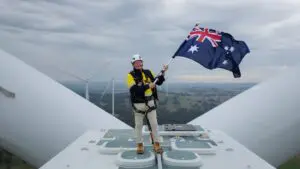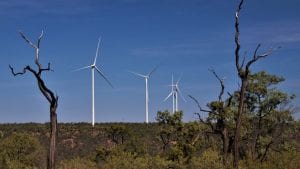Vector to deploy Tesla battery storage. But while Australian utilities weigh their options, Transgrid says competitive battery storage still up to decade away. Hello!
New Zealand electricity network operator Vector has signed a partnership to bring the Tesla battery storage devices to its home market in Auckland, and Australian networks may also follow.
 Vector CEO Simon MacKenzie was one of three senior executives of the company to make the trip to California last week for the announcement of Tesla’s battery storage pricing package.
Vector CEO Simon MacKenzie was one of three senior executives of the company to make the trip to California last week for the announcement of Tesla’s battery storage pricing package.
“This is the start of a significant change in the energy industry,” MacKenzie told the New Zealand Herald on Monday.
“Tesla is the largest producer of batteries in the world, as well as the most cost effective, and this strong relationship will allow us to take it to the next level across the country.”
Vector became the first electricity network operator to offer solar and storage to its customers as part of a leasing plan that helped it defray the cost of grid upgrades.
Mackenzie said the Tesla battery storage options – and the sharp fall in price – would open up opportunities for community based renewable and storage, and for renters and low income households.
“For some communities, communal renewables and storage systems make a great deal of sense,” he said.
Vector chairman Michael Stiassny, who also attended the event, said customers wanting choice in the way they produce, use and manage their energy.
“The Vector/Tesla partnership will revolutionise the way the customers consume energy along with real network benefits for Vector and its customers.”
Despite Vector’s innovative program, the network has comparatively few solar and storage units in its network, with only around 300 solar units. (There has been no separate subsidy scheme in New Zealand).
Musk compared the impact of battery storage with that of cell phones on the land line.
“What we’ll see is something similar to what happened with cell phones versus land line where cell phones actually leap-frogged the land lines and there wasn’t the need to put land lines in a lot of countries.”
Tesla said it was in talks with various Australian energy providers, and hoped to make announcements soon.
The major retailers are rolling out battery storage options, with AGL Energy bringing forward its plans for a 6kWh battery, although it has yet to announce its storage partner.
Network operators are also looking to deploy battery storage at grid scale, including as a cheaper option for grid upgrades and for creating local mini-grids, to improve the reliability of power supplies in regional areas, and in major cities.
Ergon is deploying around 100 units of 100kW/h battery systems to offset the cost of upgrades. It says this will reduce its costs by around one third.
But it was interesting to note that Transgrid CEO Peter McIntyre, the monopoly transmission company in NSW, who said on Tuesday that he did not expect storage to become competitive “for another five to 10 years”.










